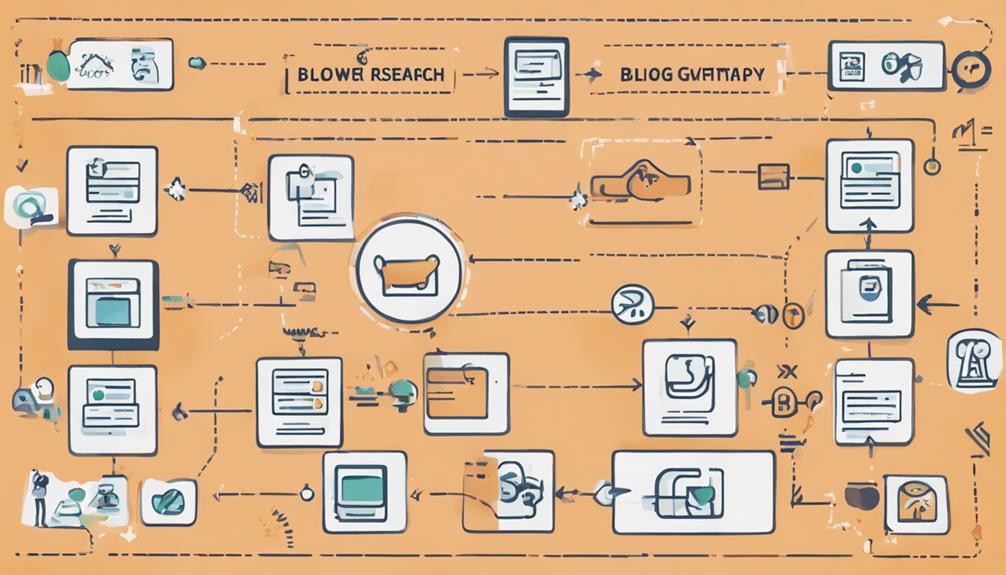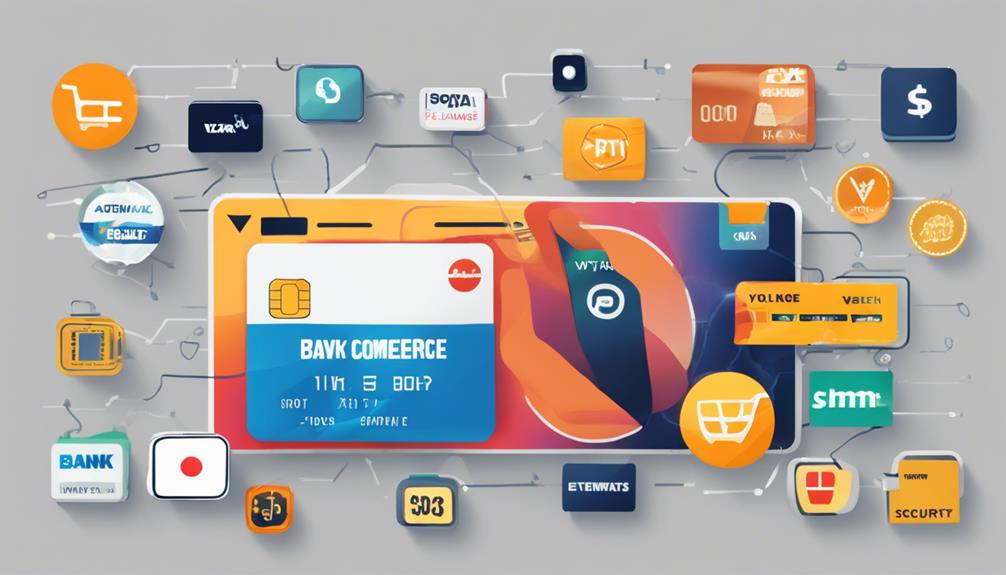To understand Credit Card Processing ISOs, they are Independent Sales Organizations focusing on marketing and selling credit card processing services. They help with payment transactions, offer merchant accounts, and collaborate with credit card companies for tailored solutions. Acting as intermediaries between businesses and acquiring banks, ISOs set up merchant accounts and provide payment processing services. Revenue is earned through transaction fees and equipment sales. Discover more about the crucial role ISOs play in the domain of payment processing for businesses.
Key Takeaways
- ISOs specialize in marketing and selling credit card processing services.
- They facilitate payment transactions and offer merchant accounts.
- ISOs act as intermediaries between businesses and acquiring banks.
- They generate revenue through transaction fees and equipment sales.
- ISOs provide tailored payment processing solutions and 24/7 customer support.
Definition of Credit Card Processing ISOs

Credit Card Processing ISOs are independent sales organizations that specialize in marketing and selling credit card processing services on behalf of financial institutions. These ISOs play an important role in facilitating payment transactions for merchants by bridging the gap between businesses and financial entities. By offering merchant accounts, ISOs enable businesses to accept various forms of payment, including credit card transactions. They act as intermediaries, making sure that businesses have access to the necessary tools and services to process payments efficiently. ISOs work closely with credit card companies to maintain industry standards and provide tailored solutions to meet the specific needs of merchants.
In addition to setting up merchant accounts, ISOs assist with payment processing, equipment sales, and customer support to guarantee smooth transaction processes for businesses. They generate revenue through transaction fees and equipment sales or rentals, while also offering value-added services to enhance the overall payment experience for merchants. ISOs are essential partners for businesses looking to streamline their payment processing operations and expand their capabilities in an ever-evolving financial landscape.
Role of ISOs in Payment Processing

Shifting seamlessly from discussing the definition of Credit Card Processing ISOs, let's now explore the pivotal role these organizations play in the domain of payment processing. ISOs act as intermediaries between businesses and acquiring banks in the credit card processing industry. They facilitate the setup of merchant accounts, providing payment processing services and offering equipment sales to businesses.
ISOs are vital in enabling businesses to accept various payment methods, providing tailored solutions not always offered by traditional financial institutions. These organizations are registered and regulated by major credit card companies to guarantee compliance with industry standards. ISOs generate revenue through transaction fees and equipment sales or rentals to businesses.
ISOS Vs Payment Processors Distinction

When considering the distinction between ISOs and payment processors, it's important to understand that ISOs primarily provide services related to merchant accounts and tailored solutions, while payment processors focus on handling transaction processing.
ISOs act as intermediaries between businesses and financial institutions, offering personalized merchant services, whereas payment processors concentrate on the technical and financial aspects of processing transactions efficiently.
ISOS Provide Services
ISOs differentiate themselves from payment processors by focusing on establishing merchant relationships, setting up accounts, and providing specialized payment solutions tailored to individual businesses. These merchant services providers, such as ISOs, offer specific needs like credit card payments to businesses looking to accept credit cards.
Unlike third-party processors that handle the technical and financial aspects of transaction processing, ISOs play an essential role in enabling businesses to accept various payment methods and provide customized payment solutions. By offering these tailored services, ISOs bridge the gap between businesses and payment processors, ensuring that merchants have the support and tools necessary to facilitate seamless payment transactions.
This personalized approach sets ISOs apart in the payment processing ecosystem, catering to the unique requirements of each business they serve.
Processors Handle Transactions
How do payment processors differ from ISOs in handling credit card transactions efficiently?
ISOs, as independent sales organizations, focus on marketing credit card processing services, while payment processors are responsible for managing the technical and financial aspects of transaction processing.
ISOs serve as intermediaries between businesses and payment processors or acquiring banks, specializing in setting up merchant accounts and providing necessary equipment.
Some businesses operate as both ISOs and payment processors, offering thorough services tailored to specific business needs.
Especially important for businesses in high-risk industries, ISOs provide specialized payment processing solutions not always available through larger financial institutions.
Understanding the distinction between ISOs and payment processors is crucial for businesses seeking efficient and reliable credit card transaction processing services.
Benefits of Working With ISOS

By partnering with ISOs, businesses can access tailored payment processing solutions that cater to their specific needs and industry requirements. ISOs offer a range of benefits that can enhance your payment processing experience.
One key advantage is the availability of 24/7 customer support, ensuring assistance and guidance whenever you need it. For businesses operating in high-risk industries, ISOs can help navigate specialized payment processing requirements, providing expertise and tailored solutions.
Additionally, ISOs offer value-added services such as data analytics, fraud protection, and customized reporting tools to help optimize your payment processes. Partnering with ISOs can also lead to cost-effective solutions that are flexible and scalable based on your business size and industry demands.
Drawbacks of ISO Partnerships

When considering drawbacks of ISO partnerships, it's essential to be aware of:
- Revenue sharing challenges that can impact your profits.
- Limited branding opportunities that may hinder your ability to establish a strong market presence.
Additionally, compliance and control concerns could restrict your flexibility and decision-making power within the partnership.
Revenue Sharing Challenges
Managing revenue sharing challenges in ISO partnerships can present obstacles that require careful management and communication. Disagreements over profit distribution, difficulties in tracking revenue sharing accurately, and disputes related to contractual agreements can all contribute to these challenges.
When there's a lack of transparency in the revenue sharing processes, trust issues may arise, leading to strain in the partnership. To address these issues effectively, clear communication, precise tracking systems, and a shared understanding of partnership goals are vital.
Limited Branding Opportunities
ISO partnerships present a challenge for businesses by limiting their branding opportunities and requiring them to operate under the branding of the ISO rather than their own. When businesses lose control over their brand image in credit card processing, it can impact customer perception, trust, and credibility.
The lack of branding control may lead to confusion among customers about the actual service provider, affecting long-term customer loyalty. To maintain a strong market presence, businesses must carefully consider the implications of partnering with ISOs on their overall marketing strategy.
Ensuring alignment between the ISO's branding and the business's values is essential for maintaining a consistent and trustworthy image in the eyes of customers.
Compliance and Control
In partnering with ISOs for credit card processing, businesses may encounter challenges related to compliance and control that can impact their operational autonomy and decision-making processes. Drawbacks include limited control over pricing and underwriting decisions, as well as compliance requirements that restrict business autonomy. Customization of services to meet specific needs may be challenging due to standardized processes.
Control over customer service and support is often limited when working with ISOs. Additionally, partnering with ISOs can result in reduced flexibility in negotiating terms and conditions for payment processing solutions. These factors can affect the overall flexibility and control that businesses have over their credit card processing operations, highlighting the importance of carefully considering these aspects when entering into ISO partnerships.
Evaluating ISOs for Your Business

When selecting an ISO for your business, focus on their hardware and software solutions tailored to your specific needs. Evaluate the ISOs based on the credit card processing volume you anticipate, ensuring they can accommodate your business growth.
Look for sophisticated software solutions that can streamline your payment processing, making transactions more efficient for both you and your customers. Additionally, consider if the ISO offers loyalty programs integrated into payment reports to enhance customer retention and encourage repeat business.
Be cautious of hidden fees and long contract lengths when evaluating ISOs for your business, as these can impact your overall costs and flexibility. Taking the time to assess these factors will help you find an ISO that aligns with your business requirements and sets you up for success in the long run.
Understanding ISO Payments Mechanism

When it comes to understanding the ISO payments mechanism, it's important to grasp the payment authorization process and transaction settlement timing.
Payment authorization involves verifying the transaction details and ensuring funds are available for the purchase.
Transaction settlement timing refers to when the funds from the customer's account are transferred to the merchant's account.
Payment Authorization Process
Understanding how payment authorization works in the ISO payments mechanism is vital for merchants looking to guarantee smooth and secure transactions. When a cardholder makes a purchase, the merchant requests approval from the cardholder's bank through payment authorization. Here's how it typically unfolds:
- The merchant sends transaction details to the acquiring bank.
- The acquiring bank forwards the request to the card network.
- The card network routes the authorization request to the cardholder's issuing bank for approval.
This process guarantees that the transaction is valid, funds are available, and fraud checks are conducted promptly. Once approved, an authorization code is generated, allowing the merchant to finalize the sale swiftly.
Transaction Settlement Timing
To grasp the essence of transaction settlement timing in the ISO payments mechanism, merchants must comprehend the significance of swift fund access. ISOs typically settle credit card transactions within 1-2 business days, ensuring quick access to funds for merchants.
The timing of settlement can vary depending on the type of card used, with Visa and Mastercard transactions usually settling faster than Discover or American Express. Some ISOs offer expedited funding options for a fee, such as same-day or next-day funding, enabling merchants to access funds more rapidly.
Factors like processing volume, risk level, and industry can also influence settlement timing, impacting when funds become available. Understanding these nuances is essential for merchants to manage cash flow effectively and plan their business operations efficiently.
Factors for Choosing ISO Partners

Considering the diverse range of factors involved, how can you effectively choose the right ISO partner for your business needs? Here are three key considerations to help you make an informed decision:
- Evaluate Industry Relationships: Look into the ISO's existing partnerships within the merchant services industry. A strong network can provide valuable connections and opportunities for your business.
- Assess Technological Capabilities: Make sure that the ISO offers advanced and reliable technological solutions that align with your business requirements. From hardware to software, technological compatibility is vital for seamless payments processing.
- Compare Pricing Structures: Compare the pricing models offered by different ISOs. Look beyond just the costs and consider the value you receive for those prices. A transparent and competitive pricing structure can impact your bottom line significantly.
Differentiating Acquirers and ISOs

To distinguish between acquirers and ISOs, it's crucial to understand their distinct roles in the credit card processing industry. Acquirers are responsible for running the technology that processes debit and credit card transactions. They also communicate with financial institutions to secure transaction approvals.
On the other hand, ISOs resell payment processing technology and services, often developing their own technology and offering value-added services to clients. Bank ISOs typically belong to banks or credit unions and provide consolidated financial services. In contrast, non-bank ISOs focus on cutting-edge services and exceptional customer support, working with multiple acquirers.
ISOs/MSPs in Credit Card Processing

When exploring credit card processing, understanding the role of ISOs and MSPs is essential for businesses seeking efficient solutions. ISOs, short for independent sales organizations, are authorized to sell and work with Visa or MasterCard merchant accounts. On the other hand, MSPs, which stands for MasterCard's service provider, are entities that perform similar functions to ISOs in the domain of credit card processing.
Here are three key aspects to take into account when looking into ISOs/MSPs in credit card processing:
- ISOs/MSPs undergo a rigorous registration process to demonstrate financial viability and reliability.
- ISOs/MSPs offer a range of additional services beyond just processing payments, such as providing hardware, payment terminals, data security, and reporting/analytics.
- Selecting the best ISO/MSP involves evaluating factors like merchant-friendly rates, relevant solutions tailored to your business needs, and the availability of 24/7 customer service.
Frequently Asked Questions
What Is an ISO in Credit Card Processing?
An ISO in credit card processing is an independent sales organization that markets and sells credit card processing services of banks or credit card companies.
Acting as intermediaries between financial institutions and businesses needing to process credit card transactions, ISOs must maintain certain standards, be registered with major credit card companies, and have a relationship with a sponsoring bank.
Revenue for ISOs comes from transaction fees and equipment sales or rentals in the credit card processing industry.
What Is the ISO Format for Payment Processing?
The ISO format for payment processing streamlines transactions through third-party organizations connecting businesses with banks. ISOs market and sell credit card processing services, essential for businesses to accept various payment methods.
Revenue is generated from transaction fees and equipment sales. This format provides tailored solutions not always available from larger financial institutions, ensuring businesses have access to efficient payment processing.
What Is the ISO Standard for Payment Cards?
The ISO standard for payment cards encompasses various regulations set by the International Organization for Standardization. ISO 7810 defines physical card characteristics, ISO 8583 governs message exchanges in transactions, and ISO 14443 focuses on proximity card standards for contactless payments.
Compliance with these standards is vital for ensuring secure, efficient, and interoperable payment card processing systems. Adhering to ISO guidelines helps maintain consistency and reliability across the payment card industry.
What Does ISO Mean on Card?
ISO on a card stands for 'Independent Sales Organization,' serving as a third-party link in credit card transactions. This intermediary connects businesses with banks and credit card companies, enabling smooth payment processing.
What Are the Key Components of Credit Card Processing ISOs?
Credit card processing ISOs consist of several essential components. First, a reliable payment gateway helps facilitate secure transactions online. Additionally, an acquiring bank is crucial for authorizing and settling transactions. Furthermore, an ISO agent, who acts as a liaison between merchants and processors, plays a vital role. The master credit card processingISO ensures coordination among these key elements for seamless payment processing.
Conclusion
To sum up, understanding credit card processing ISOs is essential for businesses looking to streamline their payment processing. By partnering with ISOs, you can gain access to a range of benefits such as competitive rates and tailored solutions.
However, it's important to carefully consider the drawbacks and payment mechanisms involved. Remember, choosing the right ISO partner can make all the difference in maximizing your efficiency and profitability in the long run.










